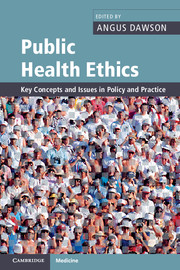Book contents
- Frontmatter
- Contents
- List of contributors
- Preface
- Acknowledgements
- Section 1 Concepts
- Section 2 Issues
- 5 Smoking, health and ethics
- 6 Infectious disease control
- 7 Population screening
- 8 Vaccination ethics
- 9 Environment, ethics and public health
- 10 Public health research ethics
- 11 Equity and population health
- 12 Health inequities
- Index
- References
5 - Smoking, health and ethics
Published online by Cambridge University Press: 05 July 2011
- Frontmatter
- Contents
- List of contributors
- Preface
- Acknowledgements
- Section 1 Concepts
- Section 2 Issues
- 5 Smoking, health and ethics
- 6 Infectious disease control
- 7 Population screening
- 8 Vaccination ethics
- 9 Environment, ethics and public health
- 10 Public health research ethics
- 11 Equity and population health
- 12 Health inequities
- Index
- References
Summary
Introduction
The moral status of smoking is much disputed. Because smoking is known to be harmful to the health of the smoker, and to those exposed to their smoke, and because smoking is addictive, it is natural for public health practitioners and policy makers to consider smoking to be a public health problem, and to seek ways to eradicate it, or at least bring it under control (Boyle et al., 2004). Because smoking is for many smokers a pleasure, and an activity rich in social and cultural meaning, it is natural for such smokers (and some non-smokers) to resist these attempts to control smoking. For those smokers for whom their smoking is no longer a pleasure, or for whom it may be a pleasure but who accept that it is a pleasure they wished they could forego, attempts to control smoking can be both aid and irritant. And even unrepentant smokers would concede that encouraging young children to take up smoking would be discreditable at least, immoral at worst.
In many respects, then, smoking provokes as complex social, moral and legal reactions as those other risky, scandalous and usually pleasurable activities sex and drinking. We can begin to get an understanding of the moral issues by distinguishing those moral issues that arise in connection with the smoker's self-regarding behaviour, and those which arise in connection with her other-regarding behaviour.
- Type
- Chapter
- Information
- Public Health EthicsKey Concepts and Issues in Policy and Practice, pp. 85 - 99Publisher: Cambridge University PressPrint publication year: 2011
References
- 2
- Cited by



